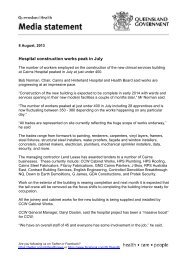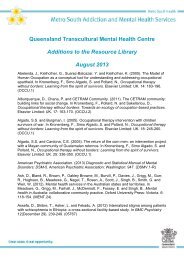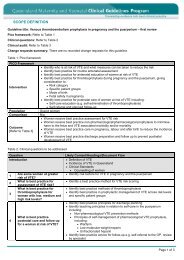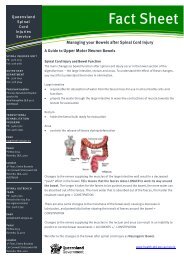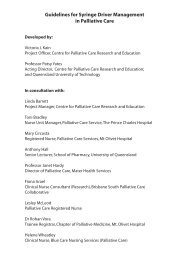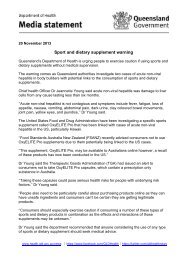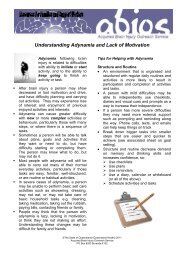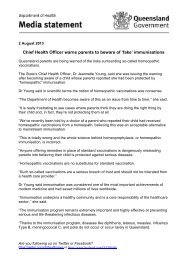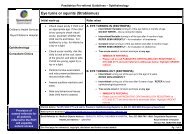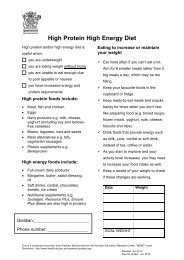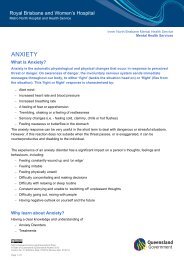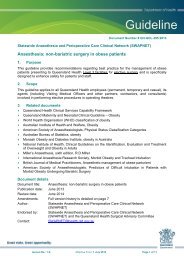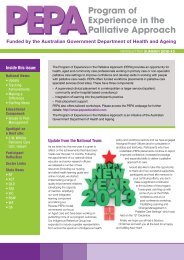Colds and flu - Queensland Health
Colds and flu - Queensland Health
Colds and flu - Queensland Health
Create successful ePaper yourself
Turn your PDF publications into a flip-book with our unique Google optimized e-Paper software.
Emergency<br />
Department<br />
fact sheets<br />
Seizure<br />
<strong>Colds</strong> <strong>and</strong> Flu<br />
health • care • people<br />
www.health.qld.gov.au/emergency<br />
About colds <strong>and</strong> <strong>flu</strong><br />
A cold is caused by a virus that affects the nose, throat<br />
<strong>and</strong> upper airways. There are more than 200 different<br />
viruses that can cause a cold. The <strong>flu</strong> (in<strong>flu</strong>enza) is caused<br />
by more severe viruses.<br />
Adults usually have three to four colds each year. Children<br />
usually have more, as their immune systems are not as<br />
strong. While a cold can make you feel miserable, most<br />
cases will clear up in a week.<br />
What causes a cold or <strong>flu</strong>?<br />
When someone with a cold or <strong>flu</strong> coughs or sneezes, they<br />
expel tiny droplets that can contain a cold or <strong>flu</strong> virus.<br />
These tiny droplets can spread the virus from person to<br />
person. A virus can also be spread by close contact, such<br />
as shaking h<strong>and</strong>s or kissing someone who has a cold.<br />
<strong>Colds</strong> <strong>and</strong> <strong>flu</strong> are more common in winter as people spend<br />
more time indoors with each other, which increases the<br />
chances of infection.<br />
What are the symptoms?<br />
A common cold can cause a blocked or runny nose, red<br />
watery eyes, <strong>and</strong> a sore throat, coughing, sneezing <strong>and</strong><br />
feeling generally unwell.<br />
Uncommon symptoms include nausea <strong>and</strong> vomiting, headaches,<br />
swollen lymph nodes (gl<strong>and</strong>s), fever <strong>and</strong> a husky or<br />
hoarse-sounding voice.<br />
With the <strong>flu</strong>, the symptoms come on more quickly <strong>and</strong><br />
there is a fever, tiredness, headaches, muscle aches/pains,<br />
cough, shivering <strong>and</strong> feeling hot <strong>and</strong> cold. The nose is not<br />
as runny. Flu is unlikely to cause serious illness in healthy<br />
people.<br />
People most at risk of serious illness are those who suffer<br />
from other chronic illness, have lowered immunity (from<br />
medications or illnesses), the elderly <strong>and</strong> those with respiratory<br />
diseases. Poor health <strong>and</strong> smoking cigarettes will<br />
make infections more likely <strong>and</strong> can make symptoms more<br />
severe.<br />
Home care<br />
A virus cannot be treated with antibiotics. Your body’s<br />
immune system will be able to fight the virus <strong>and</strong> can be<br />
helped in a number of ways.<br />
• Rest – Have plenty of sleep <strong>and</strong> rest. Stay home from<br />
work or study <strong>and</strong> away from others while you have a<br />
cold or <strong>flu</strong>.<br />
• Take simple painkillers – Such as paracetamol, to<br />
help relieve headaches, muscles aches <strong>and</strong> pains <strong>and</strong><br />
fever. Check the packet or bottle for the right dose.<br />
• Keep hydrated (drink plenty of <strong>flu</strong>ids) – This will<br />
help keep your throat moist <strong>and</strong> replace <strong>flu</strong>id lost<br />
due to a fever <strong>and</strong> sweating. Plenty of water is best,<br />
however juice <strong>and</strong> cordial are fine to drink in small<br />
quantities. Avoid tea, coffee <strong>and</strong> alcohol as they will<br />
make you more dehydrated.<br />
• Eat soft food – Soft foods are easier to swallow.<br />
Foods such as chicken soup may help a sore throat<br />
<strong>and</strong> reduce mucous (sticky <strong>flu</strong>id).<br />
• Use nasal drops or spray – This may help to clear<br />
a blocked nose in the short term (two to three days).<br />
Ask your health care professional what is best for you.<br />
• Use gargles <strong>and</strong> cough lozenges – These can help<br />
soothe a sore throat.<br />
• Do not give aspirin to children - unless advised by<br />
your doctor.<br />
• Inhale steam – This may help a blocked nose. Put<br />
boiled water in a bowl with menthol, camphor or<br />
friar’s balsam, then put a towel over your head <strong>and</strong><br />
breathe in the steam through your nose <strong>and</strong> out<br />
through your mouth. Eucalyptus, tea tree oil, peppermint<br />
or inhalants may help to ease a stuffy head.<br />
Take care not to burn yourself. Do not use with<br />
children.<br />
What to expect<br />
• Your cold is likely to last a few days but may last up to<br />
ten days. A cough may linger for three weeks.<br />
• The <strong>flu</strong> can last ten to 14 days.<br />
Treatment<br />
Medical <strong>and</strong> nursing staff will examine you to ensure you<br />
have no serious illness. Your cold should clear up within a<br />
week, <strong>and</strong> is best treated at home.<br />
•<br />
•<br />
Sometimes colds <strong>and</strong> <strong>flu</strong> can trigger asthma (in those<br />
with asthma).<br />
Sometimes a cold can lead to a bacterial infection. If this<br />
happens you may need antibiotics.
Prevention<br />
• Wash your h<strong>and</strong>s every time you touch a tissue,<br />
sneeze or cough into your h<strong>and</strong>. Throw tissues away<br />
once you have used them.<br />
• A <strong>flu</strong> vaccine is available but is not needed by most<br />
healthy adults. The vaccine may help elderly people<br />
<strong>and</strong> those with existing health problems. High risk<br />
groups, such as childcare workers <strong>and</strong> health professionals,<br />
should be immunised each year.<br />
• There is no evidence that vitamins prevent colds. Do<br />
not give children vitamins unless advised by a doctor<br />
or health care professional.<br />
• Regular exercise, a balanced diet <strong>and</strong> adequate sleep<br />
will help keep your immune system strong.<br />
Seeking help<br />
In a medical emergency go to the nearest hospital emergency<br />
department or call an ambulance (dial 000).<br />
For other medical problems see your local Doctor or<br />
health-care professional.<br />
13 HEALTH (13 43 25 84) provides health information,<br />
referral <strong>and</strong> teletriage services to the public in all parts of<br />
Queensl<strong>and</strong> <strong>and</strong> is available 24 hours a day, 7 days a week,<br />
365 days a year for the cost of a local call*.<br />
*Calls from mobile phones may be charged at a higher rate. Please check<br />
with your telephone service provider<br />
Disclaimer: This health information is for general education<br />
purposes only. Please consult with your doctor or<br />
other health professional to make sure this information is<br />
right for you.<br />
Notes:<br />
Want to know more?<br />
• Ask your local doctor or health care professional<br />
• Visit <strong>Health</strong>Insite<br />
www.healthinsite.gov.au<br />
• Visit the Better <strong>Health</strong> Channel<br />
www.betterhealth.vic.gov.au<br />
Follow up with:<br />
Date <strong>and</strong> Time-<br />
Name-<br />
The design <strong>and</strong> general content of this factsheet are reproduced with the<br />
permission of the Victorian Minister for <strong>Health</strong>, from factsheets that are<br />
Copyright © the State of Victoria. Unauthorised reproduction <strong>and</strong> other<br />
uses comprised in the copyright are prohibited without permission.<br />
<strong>Colds</strong> <strong>and</strong> Flu



